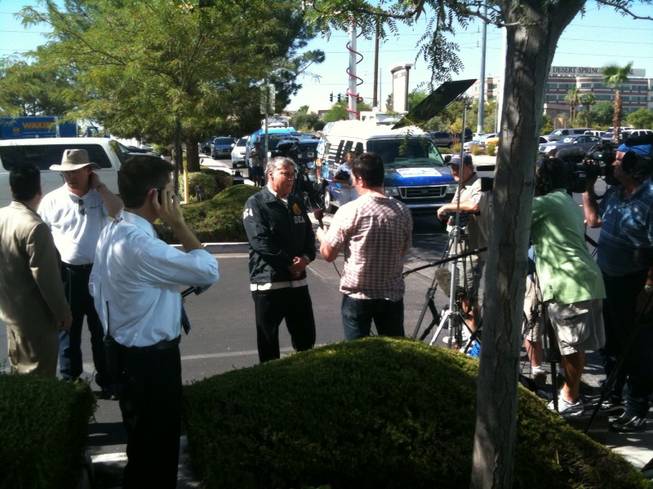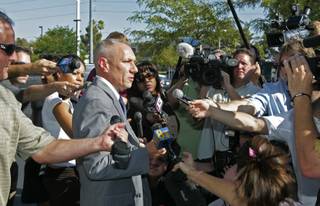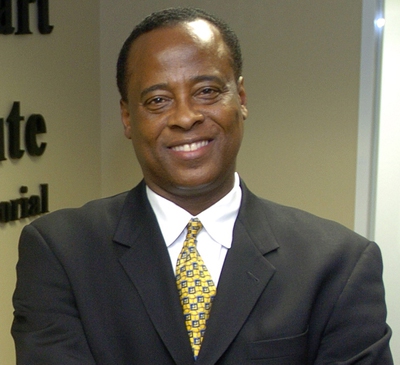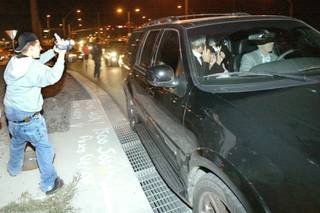
Michael Flanagan, a special agent with the Drug Enforcement Agency’s Nevada office, addresses the media Tuesday outside the Las Vegas office of Dr. Conrad Murray. Law enforcement agencies have executed search warrants on Murray’s home and office in connection with the death of singer Michael Jackson.
Published Tuesday, July 28, 2009 | 9:15 a.m.
Updated Tuesday, July 28, 2009 | 3:58 p.m.
Conrad Murray's office
Related Blogs
- Joe Brown: Michael Jackson: 'The Greatest Show on Earth'
- The Kats Report: Remembering when Michael Jackson really was bad
- Culture and Entertainment: By coincidence, Michael Jackson items up for auction
Related Stories
- Michael Jackson dead at 50 (6-25-2009)
- Jackson-to-Vegas rumors were really off the wall (3-5-09)
- Nuts about the King of Pop (6-4-07)
Federal authorities executed a search warrant this morning at the Las Vegas medical office and home of Michael Jackson's personal physician, Dr. Conrad Murray, as part of a manslaughter investigation into the singer's death.
Michael Flanagan, assistant special agent in charge of the Drug Enforcement Administration office in Las Vegas, said the DEA, Los Angeles Police Department and Metro Police were looking for documents at Murray's office at 2110 East Flamingo Road.
Investigators arrived at Murray’s office and his gated west Las Vegas Valley home shortly after 9 a.m., Flanagan said.
Flanagan told several reporters outside Murray's office that the search warrant is sealed but pertains to Jackson's death.
"We are looking for documents," Flanagan said, but he didn't specify what kind of documents investigators were looking for, other than to say it could include paper documents and computer files.
Murray was home when investigators arrived. His staff members are cooperating at his office, Flanagan said.
Investigators finished their search at Murray’s home a little after noon, but the search at the office took longer.
“When you go through these documents, you go page by page by page,” Flanagan said. “Clearly that’s very time consuming.”
Media gathered outside the west gate of Red Rock Country Club, where Murray resides, to catch a glimpse of activity, though none could be seen. Some passersby asked members of the media what was going on while others took their own snapshots of the news media members on the sidewalk.
At about 12:30 p.m., law enforcement vehicles exited the gated community, led by two police motorcycles.
The search was being conducted under the direction of the DEA Las Vegas Tactical Diversion unit, which was created in May to bring together federal officials, Metro Police, Henderson Police and the Nevada Department of Public Safety to address prescription drug abuse in the valley, Flanagan said.
A lawyer who has represented Murray in financial cases in Las Vegas, Puoy Premsrirut, did not immediately respond to a message left at her office seeking comment.
Murray was Michael Jackson's personal physician and was with Jackson when he died. Murray, who is based in Las Vegas and is licensed in California, Nevada and Texas, had his Houston office and a storage unit searched last week by DEA agents. Court records show the agents were seeking evidence of whether the doctor committed manslaughter.
Police say Murray is cooperating and have not labeled him a suspect.
Toxicology reports are still pending, but investigators are working under the theory that the anesthetic propofol caused Jackson's heart to stop, a law enforcement official told The Associated Press on Monday. Jackson is believed to have been using the powerful drug for about two years and investigators are trying to determine how many other doctors administered it, according to the official who spoke on condition of anonymity because the investigation is ongoing.
The official said Jackson regularly received propofol and relied on it like an alarm clock. A doctor would administer it when Jackson went to sleep, then stop the IV drip when the singer wanted to wake up.
The day Jackson died, Murray gave him the drug through an IV sometime after midnight, the official said.
Murray's lawyer, Edward Chernoff, has said the doctor "didn't prescribe or administer anything that should have killed Michael Jackson." When asked about the law enforcement official's statements he said: "We will not be commenting on rumors, innuendo or unnamed sources."
In a more detailed statement posted online, Chernoff added that "things tend to shake out when all the facts are made known, and I'm sure that will happen here as well."
Murray, 51, became Jackson's personal physician in May and was to accompany him to London for a series of concerts starting in July.
He was staying with Jackson in the Los Angeles mansion and, according to Chernoff, "happened to find" an unconscious Jackson in the pop star's bedroom the morning of June 25. Murray tried to revive him by compressing his chest with one hand while supporting Jackson's back with the other.
The law enforcement official also provided a glimpse into how the pop star was living in the weeks before he died, describing the room in which Jackson slept in his rented Beverly Hills mansion as outfitted with oxygen tanks and an IV drip.
Police found propofol and other drugs in the home. An IV line and three tanks of oxygen were in the room where Jackson slept and 15 more oxygen tanks were in a security guard's shack, the official said.
Using propofol to sleep exceeds the drug's intended purpose. The drug can depress breathing and lower heart rates and blood pressure. Because of the risks, propofol is supposed to be administered only in medical settings by trained personnel.
Some of Jackson's ties to Vegas
- Jackson briefly lived in Las Vegas in this decade, moving into a mansion in Spanish Trails owned by the Prince of Brunei, a home on West Palomino Lane, and also rented a house in a westside neighborhood just west of Decatur Boulevard near Sahara Avenue, which sat on the same street as a house occupied by NBA player Gary Payton and property owned by longtime Vegas entertainer Frank Marino.
- Three years ago he was rumored to be embarking on a comeback on the Strip, and was said to be in talks with Steve Wynn for a production at Wynn Las Vegas, but Wynn firmly denied any such partnership was being discussed.
- Last year he was mentioned as a possible headliner at The Colosseum at Caesars Palace, as AEG Live was presenting his scheduled run of concerts at O2 Arena in London (which were scheduled to begin next month), but AEG Live officials said only that Jackson’s performances would be judged for viability before any plans to bring him to Las Vegas were discussed.
- His most recent reported recordings were held at Studio at the Palms last year, with acclaimed producers Akon and RedOne reportedly producing the sessions. The status and future of those recordings are uncertain.
- In December, Jackson was bailed out of the $24.5 million he owed on Neverland Ranch when Colony Capital, owned by billionaire Tom Barrack, bought the loan and sparked yet more rumors about Jackson possibly performing at the Las Vegas Hilton (Elvis Presley’s haunt from 1969-1976) because Colony owns the Hilton.
- - Written by John Katsilometes




Join the Discussion:
Check this out for a full explanation of our conversion to the LiveFyre commenting system and instructions on how to sign up for an account.
Full comments policy